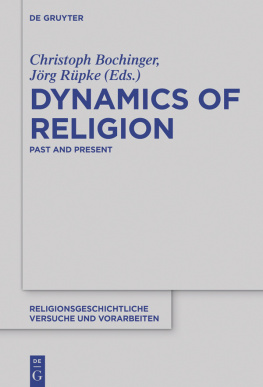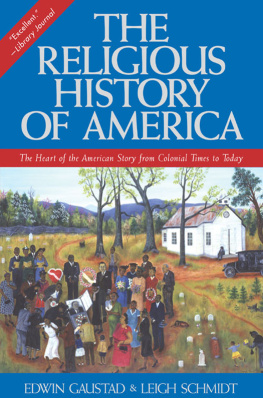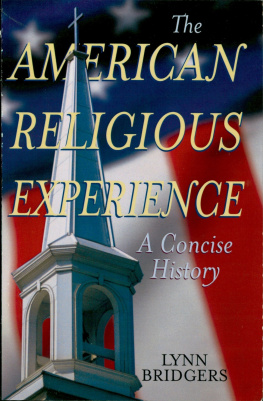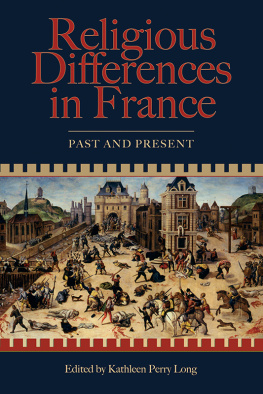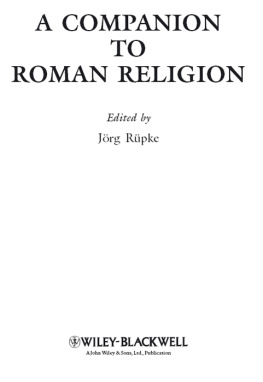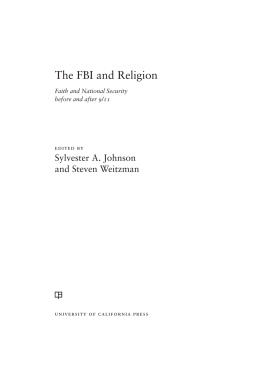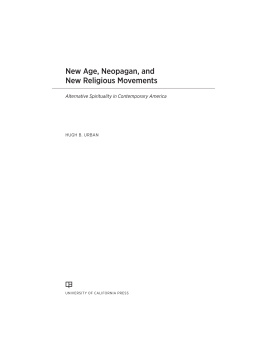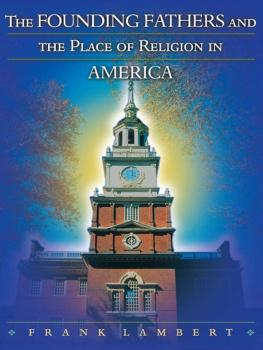COMMUNITIES OF DISSENT

COMMUNITIES OF DISSENT
A History of Alternative Religions in America
STEPHEN J. STEIN


Oxford University Press
Oxford New York
Auckland Bangkok Buenos Aires Cape Town Chennai
Dar es Salaam Delhi Hong Kong Istanbul Karachi Kolkata
Kuala Lumpur Madrid Melbourne Mexico City Mumbai Nairobi
So Paulo Shanghai Singapore Taipei Tokyo Toronto
Copyright 2000, 2003 by Stephen J. Stein
Published by Oxford University Press, Inc.
198 Madison Avenue, New York, New York 10016
www.oup.com
Oxford is a registered trademark of Oxford University Press
All rights reserved. No part of this publication may be reproduced, stored in a retrieval system, or transmitted, in any form or by any means, electronic, mechanical, photocopying, recording, or otherwise, without the prior permission of Oxford University Press.
Library of Congress Cataloging-in-Publication Data
Stein, Stephen J.,
Communities of dissent : a history of alternative religions in America/
Stephen J. Stein.
p. cm.
Includes bibliographical references and index.
ISBN 0-19-515825-3 (alk. paper)
1. CultsUnited StatesHistory. 2. SectsUnited StatesHistory.
3. United StatesReligion. I. Title.
BL2525 .S74 2002
291.90973dc21
2002006219
9 8 7 6 5 4 3 2 1
Printed in the United States of America
on acid-free paper
On the cover: The Shakers of New Lebanon, New York, Religious Exercises in the Meeting-house by Joseph Becker.
Frontispiece: Two Shaker sisters at Canterbury, New Hampshire, display their saxophones. Members of alternative religions do not always conform to uninformed stereotypes. These religious women obviously enjoy secular music.
To many friends among members of alternative religions
CONTENTS
PREFACE
The citizens of the founding generation of the United States dissented from English rule and boldly asserted their independence. The Declaration of Independence gave voice to the political aspirations of those who rebelled against a parliament that taxed colonists who had no representation in those proceedings. The U.S. Constitution, crafted after the turmoil of warfare and an era of political disunity, sought to secure peace and unity and to guarantee fundamental liberties, including the free exercise of religion. Dissent in a political context has been an honored tradition in America, and we celebrate the founders as patriots.
But Americans have not uniformly celebrated communities of religious dissent, endorsed in the Constitution by the principle of the free exercise of religion. On the contrary, the public expression of religious dissent has often resulted in opposition. People, whose views or practices differ from dominant religious patterns in American society, frequently have been the target of ridicule, harassment, and persecution. Rarely have such religious dissenters been accorded the honor that Americans regularly heap upon political dissenters.
The contrasting public images of the two different forms of dissent, political and religious, are evident in the simple juxtaposition of pairs of political and religious dissenters Thomas Paine and Ann Lee, Frederick Douglass and John Humphrey Noyes, Jane Addams and Mary Baker Eddy, Ralph Nader and David Koresh. American historians have widely celebrated the first person in each of these pairs for his or her pioneering efforts on behalf of, respectively, political liberty, the abolition of slavery, assistance to the urban poor, and protection of the environment. The second half of each pair experienced bitter opposition: Lee was physically assaulted by angry mobs in several New England towns; Noyes was run out of the country by clergy, who hoped to bring him into criminal court; Eddy was the target of vilification by former students as well as lawyers and ministers; and Koresh was harassed by the government. Moreover, historians, looking back on the roles of these religious dissenters, have often failed to offer balanced accounts of their lives.
Why have religious dissenters so often attracted the ire and hostility of others? What motivates those who attack such dissenters? What can we gain by learning more about the diverse communities of religious dissent that have been a part of American history from its earliest days? What role have these communities played in our national story, and what may we expect in the years ahead?
The chapters that follow employ a variety of terms used to identify and define religious communities of dissent. Some of these terms, including cult and sect, have long traditions of use, stretching back to the centuries when Latin was the official language of scholars. But the meanings of words often change over time; and terms that once were neutral or simply descriptive sometimes take on harshly negative implications and potentially lose their original usefulness, including the two just mentioned. Other terms have been coined more recently to circumvent the stereotypes associated with older categories. Among this newer terminology are outsider groups and New Religious Movements. Sometimes the newer nomenclature is useful despite certain limitations. Marginal religious communities, for example, is a positional designationnot a qualitative judgmentimplying a location on the margin or edge of mainstream religious groups. When using these terms, it is important to recognize that they are often loaded with powerful assumptions and implications.
Often people who attack religious dissenters are ignorant of the ideas and practices of those whom they attack. Sometimes the attackers imagine that the people who hold the alleged religious views or engage in the ascribed spiritual practices are dangerous and threatening to the attackers own religious values. Ignorance and misunderstanding regularly fuel uninformed responseswhether hateful feelings, verbal threats, or physical assaults.
Confronting someone whose religious commitments are different may challenge our own way of life, our deepest values, and our most fundamental views. Religion, when learned at the knees of parents or from clergy who appear to be guardians of truth, is deeply ingrained and many times unexamined. As long as those around us hold similar views and participate in similar practices, we are not forced to examine and evaluate our own assumptions and beliefs. But when we discover, either through personal encounter or through formal education, that not everyone holds the same beliefs or follows the same practices, we are often provoked to examine our own views.
This discovery of religious diversity can be frightening and threatening; it can fuel feelings of defensiveness and aggression. It can also be exhilarating and liberating and open a fascinating window on a new world. Either way, we tend to assume that the dissenter is an outsider. We prefer to assume that our religious beliefs and practices are in the mainstream, and therefore we have little need to justify them. We find it reassuring to locate ourselves amongst the majority. In such a situation, dissent takes on, almost by definition, a negative cast as a less legitimate position.
This is the point at which the narrative in this volumethe story of the rich tradition of communities of religious dissent throughout American historyhas something to offer. This narrative relates the engaging story of bold men and women who affirmed their deepest religious values, often in the face of physical hardship and overt hostility. Motivated by religious values and convinced of the truthfulness of their spiritual claims, these dissenters bravely faced opposition, and in most cases, the difficulties they confronted did not deter them. For them religion was a reassuring force and power that enabled them to perform under distress or hardship.
Next page

